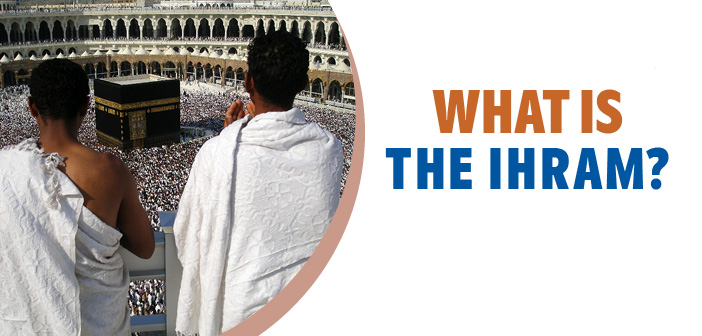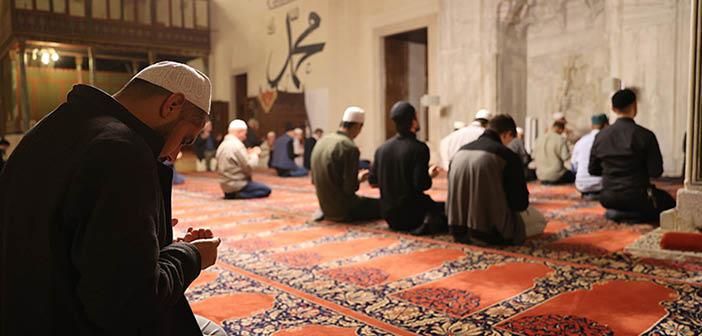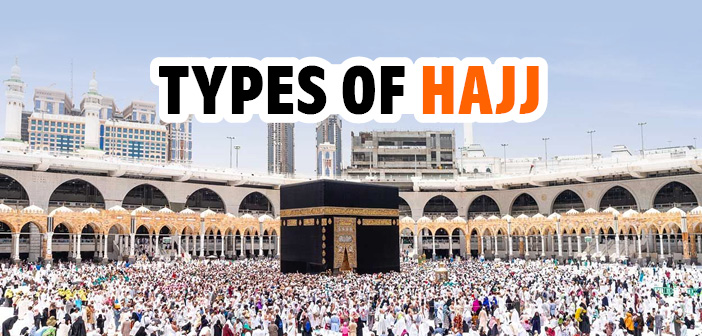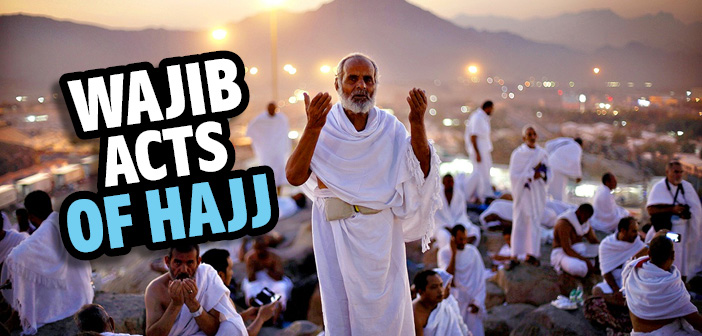
What is the Ihram?
What is the ihram in islam? How long can you stay in ihram? How do you enter ihram? What is forbidden in ihram?
Iḥrām literally means “to forbid, to deprive oneself of, to enter a place and a time to be respected and to respect them”. It is described as a term of pilgrimage with the following meaning: It is the person who intends to perform hajj or ʿumra forbids certain acts and behaviors that are normally permissible for him at other times, until the end of the hajj or ʿumra. Just as the ritual prayer begins with the “opening takbīr” called “taḥrima”, the pilgrimage begins with the process of “iḥrām”, which as a term comes from the same Arabic root. Entering the state of iḥrām is a kind of “takbīr of starting the pilgrimage”. By entering the state of iḥrām, some things that are normally permissible to do outside hajj or ʿumra become prohibited. Violation of the “prohibitions of the state of iḥrām”, can be grouped into five main categories, such as abandoning bad words and behaviors, rules related to attire, rules related to sexual life, and rules related to hunting and vegetation in the surrounding area. These violations require penalties that vary according to the type of infringed prohibition. These include sacrificing an animal, giving alms, and fasting.
According to the Ḥanafis, iḥrām is not one of the essential pillars (rukn) of pilgrimage but rather a condition (sharṭ). Entering the state of iḥrām ensues with making intention and invocation of the talbiyah. The process of this act of worship begins by making an intention for hajj or ʿumra or both and entering the state of iḥrām by intoning talbiyah for the sake of Allah.
A) Essential Pillars of Ihram
According to the Ḥanafis, there are two essential pillars of iḥrām: intention and talbiyah. A person who abandons one of these pillars does not enter the state of iḥrām. According to the other three schools, only the intention is sufficient to enter the state of iḥrām.
1) Intention
The intention is to decide whether to perform hajj or ʿumra by determining which one is to be performed. It is mustaḥab to express the intention with the tongue. Intention can be made in everyone’s native language. As a matter of fact, while Ibrahim and his son Ismāʿil (as) were building the Kaʿba, they prayed saying, “Our Lord! Accept (this service) from us: For You are the All-Hearing, the All-knowing.”[1] Since the duration of hajj and ʿumra is long, “facilitation” is asked. Acts of worship such as ritual prayer are short and do not require such supplication.
The rites of hajj and ʿumra begin with entering the state of iḥrām. If it is not reprehensible time to perform it, a two-cycle iḥrām prayer is performed after performing minor or major ablution at the mīqāt place. It is more virtuous to recite surah “al-Kafirūn” in the first cycle and surah “al-Ikhlās” in the second cycle of this prayer. After that, the person who will only perform the pilgrimage (hajj al-ifrād) says, “Allahumma innī urīdu’l-hajja, fayassirhu lī wa taqabbalhu minnī” (O Allah! I want to perform pilgrimage for Your sake. Make it easy for me and accept it from me) and I only intend to do the pilgrimage. The person who will perform hajj al-tamattūʿ (first ʿumra then hajj in separate states of iḥrām) makes an intention by saying, “Allahumma innī urīdu’l-ʿumrata fa yassirha lī wa taqabbalha minnī” (O Allah! I want to perform ʿumra for Your sake. Make it easy for me and accept it from me). Before going to the plain of Arafat, while entering the state of iḥrām for hajj in Mecca on the 8th day of Dhu’l-Hijja, he makes an intention to do the pilgrimage just as the first intention mentioned above. The person who will perform the hajj al-qirān (ʿumra and hajj together in the same state of iḥrām), on the other hand, makes an intention as follows: “Allahumma innī urīdu’l-ʿumrata wa’l-hajja, fa yassirhumā lī wa taqabbalhumā minnī” (O Allah! I want to perform ʿumra and pilgrimage together for your sake. Make them easy for me and accept them from me.)
According to the Ḥanafis, a person’s entrance to the state of iḥrām is valid when he intends to visit the Kaʿba and the surrounding holy places and when he enters the state of iḥrām, even if he does not determine with his heart and tongue whether he intends to carry out the pilgrimage, ʿumra or both. It is sufficient for such a person to determine whether his worship is hajj or ʿumra before starting circumambulation. If he commences circumambulating without making such a determination, he is accepted to have entered the state of iḥrām for ʿumra. If he goes directly to the plain of Arafat and performs ritual standing (waqfa) on the day of Arafa without making circumambulation, this iḥrām will be accepted for the pilgrimage and his pilgrimage will be the “ifrād pilgrimage”.
According to the Shafiʿis, in such a case, the ambiguity in the intention must be cleared before starting any of the rituals related to hajj and ʿumra, for example, circumambulation. Otherwise, the rituals made do not gain value as hajj or ʿumra because an act of worship is valid only if it is done with an intention.
According to Abu Ḥanīfa and Abu Yusuf, if a person who has not performed the obligatory pilgrimage before intends to perform a supererogatory pilgrimage, this pilgrimage will be considered supererogatory. As a matter of fact, intending a pilgrimage or a votive pilgrimage on behalf of someone else does not affect the obligatory pilgrimage and he will be performing the pilgrimage to which he intends. According to Imam Muhammad and Imam Shafiʿi, in such a case, the pilgrimage to be performed with the intention of a supererogatory pilgrimage turns into a farḍ pilgrimage.[2] The evidence is based upon the comparison of the issue of pilgrimage to the issue of intending a voluntary fast during the month of Ramadan. As a matter of fact, even if one intends to do supererogatory fasting in Ramadan, the fast to be observed will be accepted as Ramadan fasting.
2) Talbiyah
Talbiyah means uttering certain words that determine the starting moment of the process of hajj or ʿumra. Talbiyah is a kind of opening takbīr of the ritual prayer. It is reported that the Prophet (saw) performed the talbiyah after performing a two-cycle iḥrām prayer.[3]
After making the appropriate intention as stated above, the following talbiyah is recited:
لَبَّيْكَ اَللَّهُمَّ لَبَّيْكَ ، لَبَّيْكَ لاَشَريكَ لَكَ لَبَّيْكَ، اِنَّ الْحَمْدَ وَ النِّعْمَةَ لَكَ وَ الْمُلْكَ ، لاَشَريكَ لَكَ.
“Labbayk, Allāhumma labbayk. Labbayka lā sharīka laka labbayk. Inna’l-ḥamda wa’n-niʿmata laka wa’l-mulka, lā sharīka lak.”[4]
“Here I am [at your service] O Allah, here I am. Here I am [at your service]. You have no partners, here I am. To You alone is all praise and all excellence, and to You is all sovereignty. There is no partner to You.”
It is possible and permissible to make intention and talbiyah in Persian, Turkish, or in any other language.[5]
It is necessary to say the talbiyah at least once before entering the state of iḥrām. However, this necessity does not mean that it has to be with the exact words of talbiyah itself but refers to be with any phrase used to glorify Allah (taʿzīm). It is narrated that Aisha (r.anha) said in response to a question, “One can enter the state of iḥrām with tahlīl and talbiyah.”[6] Tahlīl means uttering kalima al-tawḥīd, that is, “La ilāha illallāh” (There is no god but Allah).
According to the Ḥanafis, a person enters the state of iḥrām when he makes intention at the place of mīqāt and recites the talbiyah. It is mustaḥab to intone the talbiyah frequently and to raise the voice from time to time. It can be recited when one reaches the time of the dawn, that is, the last sixth of the night, and after performing the prayers, when going down a road or going up, and when encountering friends. While performing ṭawāf and saʿy, talbiyah is not recited. Women do not raise their voices much while chanting the talbiyah and saying other supplications and remembrances of Allah.
Reciting the talbiyah, according to the majority, except for the Malikis, ends with the throwing of the first pebble at the Jamra al-Aqaba on the first day of the Eid al-Aḍḥā, for this was how the Prophet practiced it.[7] The one who performs ʿumra stops reciting the talbiyah when he starts the circumambulation.
According to the Ḥanafis and the Malikis, one may enter the state of iḥrām before the months of hajj commence. This is because, according to them, iḥrām is not an essential pillar of pilgrimage but rather a condition of its validity. As in other acts of worship, time is not required to have commenced in order to fulfill a condition.
According to the Shafiʿis, it is not permissible to enter the state of iḥrām before the months of hajj commences, because iḥrām is not a condition but an essential pillar (rukn) of pilgrimage. The state of iḥrām entered before the pilgrimage months will be considered a state of iḥrām to perform an ʿumra because there is no specific time for ʿumra, one can always enter the state of iḥrām for ʿumra.
B) The Consequences of Entering The Haram Area without Entering The State of Ihram:
According to the Ḥanafis and the Malikis, no matter what the purpose is, āfāqīs who come from outside the borders of mīqāt and go to the Ḥaram region, for example, Mecca, must enter the state of iḥrām before crossing the borders of mīqāt. This is because iḥrām has been made obligatory to show respect for this holy place. In this regard, there is no difference between those who come for hajj or ʿumra and those who come for other purposes such as trade, visits, or medical treatment. They leave the state of iḥrām after performing hajj or ʿumra.
If a person who crosses the mīqāt border in his daily clothes and stays like this for one day or one night, he is deemed to have violated the prohibition of iḥrām for one day and if he does not enter the state of iḥrām by going back to the place of mīqāt again, the penalty of offering a sacrifice is required.
According to the Shafiʿis, for those (āfāqīs) who come from far away to the Ḥaram region without the intention of performing hajj or ʿumra, it is not wājib but mustaḥab to enter this region by entering the state of iḥrām. When the people of the Ḥill region are not going to perform hajj or ʿumra, they can enter and leave the Ḥaram area without entering the state of iḥrām. Those who are in the Ḥaram region, whether they are from Mecca or those who come from far away, can return to the Ḥaram region without entering the state of iḥrām when they go to the Ḥill region, for example, Arafat or Jeddah.
Āfāqīs who travel to any place in the Ḥill region, such as Jeddah, without the intention of going directly to the Ḥaram region, do not need to cross the borders of mīqāt in the state of iḥrām. If they later want to go to the Ḥaram region, for example to Mecca, they will be subject to the rule of those living in the Ḥill region. If they are going to perform hajj or ʿumra, they enter iḥrām at where they stay or without crossing the border of the Ḥaram. If they do not have the intention to perform hajj or ʿumra, they enter the Ḥaram region without entering the state of iḥrām and if they wish, they can circumambulate the Kaʿba without being in the state of iḥrām.
For those who cross the mīqāt border without entering the state of iḥrām to make their visit to Medina before the pilgrimage, if they have to go to Mecca first after they land in Jeddah, they enter the state of iḥrām in Jeddah – before crossing the border of the Ḥaram region.[8]
C) Actions Prohibited in The State of Ihram
Some certain acts and behaviors are forbidden to those who enter the state of iḥrām until they leave the state of iḥrām. These are called “prohibitions of the state of iḥrām”. It is possible to group these prohibitions as follows:
1) Prohibitions related to the body
a) Shaving the hair or beard, trimming the mustache. The following is stated in a verse: “Do not shave your heads until the offering (hady) reaches the place of sacrifice.”[9] Other parts of the body are compared to the head because a person in the state of iḥrām is defined as a person whose hair is messy and dusty.
b) Shaving, trimming and cleaning pubic and armpit hair and hair in other parts of the body.
c) Cutting nails.
d) To lubricate and dye hair, beard, and mustache for adornment purposes, to apply brilliantine and gel to the hair, and to use nail polish and lipstick for women. To apply perfume to the body or to the iḥrām clothes, and to use scented soap. The following is stated in the hadith, “A person in the state of iḥrām should not wear clothes scented with fragrance and saffron.”[10] According to Abu Ḥanīfa, if applying scented or unscented oil covers a whole limb, a penalty is required.
2) Prohibitions related to clothing and articles of clothing
Prohibitions related to clothing are for men only. Women wear their daily clothes with the only exception that they do not cover their faces.
a) To wear stitched clothes and underwear.
There is no harm in placing such over the shoulders or getting covered with an article of such clothing such as a coat or overcoat without wearing it normally. Again, a belt worn on the waist, a bag hung on the shoulder, shoes with open tops and heels, or slippers worn on the feet are not included in the prohibition of iḥrām. Therefore, easiness is provided for those who cannot find such clothes. Ibn Abbas (ra) narrates that the Prophet said in Arafat, “One who does not find shoes (to wear) he may wear stockings, but (only) after trimming them below the ankles.”[11] However, a ransom is required for those who wear these because, according to the narration from Ibn Umar (ra), the Messenger of Allah explained what the iḥrām person cannot wear when asked about it. He (saw) said, “One who is in the state of iḥrām should not wear a shirt, or a turban, or a cap, or trousers, or a cloth touched with perfume or with saffron, nor (should he wear) khuffs (leather socks), but in case he does not find shoes, (before wearing khuffs) he should trim them (in such a way) that these should become lower than the ankles.”[12]
Wearing a daily garment for a day or a night requires offering a sacrifice as a penalty. When the duration is shortened, the punishment turns into charity according to the length of wearing time.[13]
According to the Shafiʿis and the Ḥanbalis, no compensation is required for anyone who has to wear them.
b) To cover the head and face, to wear a skullcap and similar things, to wrap a turban on the head.
The Prophet (saw) said to a Companion in the state of iḥrām, who fell from his camel and died during the performance of hajj, “Do not cover his head for Allah will raise him on the Day of Resurrection pronouncing talbiyah.”[14]
When a woman enters the state of iḥrām, she covers her whole body except her head and face with a stitched dress. The woman’s face is kept open like the man’s head. The following is stated in the hadith, “A woman in the state of iḥrām should not veil her face and should not wear gloves.”[15] A woman differs from a man in three aspects in the state of iḥrām: she can wear stitched clothes, wear leather socks and cover her head.
c) Wearing gloves, socks, and shoes that cover the heels.
The following is stated in the hadiths: “… A woman in the state of iḥrām should not wear gloves.”[16], and “A person in the state of iḥrām should not wear khuffs (leather socks), but in case he does not find shoes, (before wearing khuffs) he should trim them (in such a way) that these should become lower than the ankles.”[17] Wearing shoes that cover the heels is within the scope of the prohibitions of the state of iḥrām.
3) Prohibitions related to sexual matters
a) To engage in sexual intercourse and behaviors such as kissing, flirting, and holding with lust, which usually leads to sexual intercourse.
The following is stated in the Qur’an, “Hajj is [during] well-known months, so whoever has made hajj obligatory upon himself therein [by entering the state of ihram], there is [to be for him] no sexual relations (rafas) and no disobedience and no disputing during hajj...”[18] The term “rafas” mentioned in the verse is an allusive word used for sexual contact and behaviors that lead to it. The Prophet said, “Whoever performs hajj for Allah’s pleasure and does not have sexual relations with his wife, and does not do evil or sins then he will return (after hajj free from all sins) as if he were born anew.”[19]
According to the Ḥanafis, it is permissible for a person in the state iḥrām to marry and be engaged. However, the consummation of marriage should be delayed until after the hajj because the Messenger of Allah (saw) married Maymuna (r. anha) while he was in the state of iḥrām.[20] The majority of jurists hold the opposite view, and they say that the Prophet (saw) married Maymuna while he was not in the state of iḥrām,[21] and they also rely on the following hadith, “A person in the state of iḥrām must neither marry himself, nor arrange the marriage of another one, nor should he make the proposal of marriage.”[22]
If a person who enters the state of iḥrām for pilgrimage has sexual intercourse before ritual standing at Arafat, his pilgrimage will be invalid and he has to make up for it next year. He also sacrifices a sheep (dam) as a penalty. For acts such as kissing and touching with lust that lead to sexual intercourse, a sheep is required to be sacrificed with or without ejaculation. Except for the Malikis, according to the majority, in this case, the pilgrimage does not become invalid.[23]
b) To say things that provoke sensual feelings.
4) Hunting ban
It is forbidden to hunt all kinds of land game, whether its meat is edible or not inside and outside the Ḥaram region, nor is it allowed to show a hunter the game, help the hunt, or harm the game animals.
There are various verses in the Qur’an that inform the people of iḥrām about the prohibition of hunting and the types of penalties for those who do not comply with this prohibition.[24]
Animals that are naturally wild, timid, and flee from humans are called game animals. Animals that are born and raised on land, even if they live in water, are considered land animals. It is not forbidden to hunt sea animals, and the slaughter of domestic animals such as chickens, sheep, and cattle is not prohibited in the state of iḥrām.
5) Prohibitions related to the Ḥaram area
Hunting of game animals, and cutting or plucking the plants in the city of Mecca and the surrounding area called Ḥaram is prohibited for anyone, whether in the state of iḥrām or not. There is no doubt that these prohibitions are a kind of coaching for believers in environmental protection.
6) Rebelling against Allah and treating people badly
Allah Almighty says, “Hajj is [during] well-known months, so whoever has made hajj obligatory upon himself therein [by entering the state of ihram], there is [to be for him] no sexual relations and no disobedience and no disputing during hajj.”[25] It is stated in the hadith that the pilgrim who protects himself from such acts will be cleansed from his sins after the pilgrimage and will be sinless like on the day he was born from his mother’s womb.[26] The two terms in the verse can be defined as follows:
Fusūk: To show disobedience to Allah and to do things that are considered rebellion.
Jidāl: Arguing with others, insulting, and fighting. Although such behaviors are always prohibited, they should be avoided more while in the state of iḥrām.
D) Actions and Behaviors Not Prohibited in The State of Ihram:
For the person in the state of iḥrām, bathing, using odorless soap, washing the iḥrām clothes, brushing teeth, wearing kohl, plucking a broken nail or a hair giving discomfort to the person, having a tooth extracted, having blood drawn, bandaging a wound, carrying a weapon, wearing a bracelet, earring or a watch, wearing a belt, hanging a bag on one’s shoulder, covering oneself with a blanket or quilt at night, taking a garment like a jacket, coat, etc. on the shoulders to protect oneself from the cold, using an umbrella, sitting in the shade, hunting sea animals like fish, etc., killing animals and insects that are not considered game animals such as snakes, scorpions, mice, flies, ticks, and predatory animals, such as wolves and tigers, are not included in the scope of the prohibition.
[1] Al-Baqara, 2: 127.[2] Ibn Abidīn, ibid, IV, 483, 484.[3] Al-Zaylaī, ibid, III, 21.[4] Al-Bukhari, Ḥajj, 26, Libās, 69; Muslim, Ḥajj, 19, 147, 269, 271; al-Darimī, Manāsik, 22, al-Tirmidhī, Ḥajj, 97.[5] Ibn Abidīn, Radd al-Mukhtār Trans. IV, 476.[6] Malik, Muwaṭṭā’, Ḥajj, 52.[7] Al-Nasā’ī, Manāsik, 229, Ibn Maja, Manāsik, 69; Abū Dawūd, Manāsik, 27, 28; al-Tirmidhī, Ḥajj, 78, 79.[8] Komisyon, İlmihal, Diyanet, I, 522.[9] Al-Baqara, 2: 196.[10] Al-Bukhari, Ḥajj, 21, Libās, 8, 13; Muslim, Ḥajj, 1, 2.[11] Al-Bukhari, ʿIlm, 53, Ḥajj, 21, Libās, 8, 13, 14, 37; Muslim, Ḥajj, 1, 5; al-Tirmidhī, Ḥajj, 18, 19; al-Nasā’ī, Manāsik, 30, 32-34, 37-39.[12] Al-Bukhari, Ḥajj, 21, Libās, 8, 13, Muslim, Ḥajj, 1, 2; Ibn Ḥanbal, II, 4, 8.[13] Ibn Abidīn, ibid, IV, IV, 489.[14] Al-Bukhari, Janā’iz, 20, 21; Muslim, Ḥajj, 93, 94, 97-103; Abū Dawūd, Janā’iz, 80.[15] Al-Bukhari, Sayd, 13; Abū Dawūd, Manāsik, 31; al-Tirmidhī, Ḥajj, 18; al-Nasā’ī, Manāsik, 33, 39.[16] Al-Bukhari, Sayd, 13; Abū Dawūd, Manāsik, 31; al-Tirmidhī, Ḥajj, 18; al-Nasā’ī, Manāsik, 33, 39.[17] Al-Bukhari, Ḥajj, 21, Libās, 8, 13, Muslim, Ḥajj, 1, 2; Ibn Ḥanbal, II, 4, 8.[18] Al-Baqara, 2: 197.[19] Al-Bukhari, Ḥajj, 4; Muḥṣar, 9, 10; Muslim, Ḥajj, 438; al-Nasā’ī, Ḥajj, 4; Ibn Maja, Manāsik, 3; Aḥmad ibn Ḥanbal, II, 229, 410, 484.[20] Al-Bukhari, Sayd, 12, Nikāḥ, 30, Maghazi, 43; Muslim, Nikāḥ, 46, 47, 48; al-Tirmidhī, Ḥajj, 24.[21] Al-Tirmidhī, Ḥajj, 23, 24; al-Darimī, Manāsik, 21; Aḥmad ibn Ḥanbal, VI, 393.[22] Muslim, Nikāḥ, 41-45; Abū Dawūd, Manāsik, 38; al-Tirmidhī, Ḥajj, 23; al-Nasā’ī, Manāsik, 91.[23] For more information see al-Kasanī, Badāyi al-Ṣanā’i, II, 183-206, 216-219; al-Shirazī, Muhadhdhab, I, 204-212; Ibn Qudāmah, ibid, III, 295-344; al-Shawkanī, Nayl al-Awṭār, V, 8,9; al-Zuhaylī, ibid, III, 230, ff. Ibn al-Humām, Fatḥ al-Qadīr, II, 255.[24] See al-Mā’ida, 5: 1,2, 95-97.[25] Al-Baqara, 2: 197.[26] Al-Bukhari, Ḥajj, 4; Muḥṣar, 9, 10; Muslim, Ḥajj, 438; Al-Nasā’ī, Ḥajj, 4; Ibn Maja, Manāsik, 3; Aḥmad ibn Ḥanbal, II, 229, 410, 484.
Source: Basic Islamic Principles (ilmiḥal) According to the Four Sunni Schools With Evidence From The Sources of Islamic Law, Prof. Hamdi Döndüren, Erkam Publications








